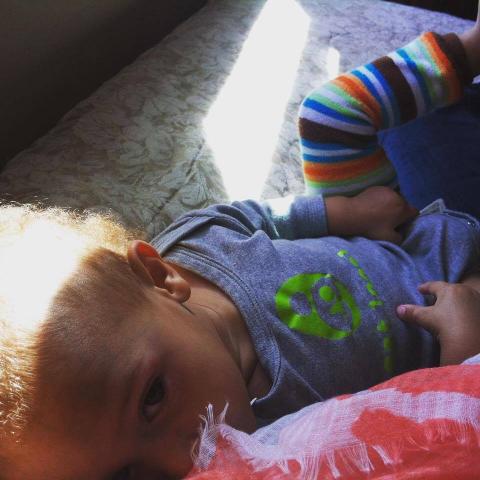
Cuddled with and breastfeeding my youngest
6 years, 3 months, 1 week and 28 days - the length of time I breastfed my four boys!
From an efficient nurser to the NICU and pumping every two hours to the baby who I never kept track of how often and for how long he nursed; I am proud of every second of that 6 years, 3 months, 1 week and 28 days, but my exprience is the exception and it should not be. Many moms want to breastfeed, but face challenge after challenging in trying to meet their breastfeeding goals. In fact, in the United States 4 out of 5 U.S. mothers start out breastfeeding, but less than half are still breastfeeding at 6 months postpartum.
Why are so many women falling short of meeting their personal breastfeeding goals and recommendations of public health professionals? It's the reason why MomsRising members share with us everyday.
- Lack of access to paid family and medical leave
- Lack of lactation support and education
- Lack of workplace accommodations
Right now, 1 in 4 women is back at work within two weeks of giving birth because they cannot afford to take any additional unpaid time away. As a result, new moms are back at work before they’ve been able to recover from giving birth and before they’ve been able to establish breastfeeding routines.
When encountering difficulties breastfeeding, many moms may seek support and guidance from lactation professionals, but for low-income women these supports are often inaccessible and unaffordable, even with limited healthcare coverage. Not to mention that the Congress’ constant back and forth about healthcare coverage leaves a question as to whether coverage is at risk.
Finally, once breastfeeding mothers return to work they face another set of challenges: lack of clean and private spaces to express breast milk and inadequate places to store that liquid gold. The Affordable Care Act requires some employers to provide hourly wage-earning and some salaried employees (nonexempt workers) with “reasonable break time” and a private, non-bathroom place to express breast milk during the workday, up until the child’s first birthday. While this protects and supports the most vulnerable of workers, this distinction in the law unintentionally excludes “exempt” or salaried employees, causing significant confusion. In fact, right now 60% of working moms in the United States find themselves pumping in inadequate and even unsanitary places on the job.
These barriers contribute to increasing health disparities leaving communities of color particularly vulnerable. It leaves black and hispanic children at a greater risk for childhood disease and the inability to exclusively breastfeed for the recommended six months has been attributed to twice as many deaths and three times as many in childhood diseases in black infants.
The good news is there is a solution! There are public policies that can help break down these barriers and empower moms to meet their breastfeeding goals. Public policy solutions like paid family and medical leave, ensuring that all moms have access to lactation support, education and supplies and workplace accommodations to express breastmilk. Enacting a comprehensive paid family and medical leave policy will ensure that moms, babies, and partners have the opportunity to heal, bond and set them off on a great start in their breastfeeding journey. Making sure that when breastfeeding moms encounter difficulties, they have access to lactation support, education and supplies is key to breastfeeding success. Once she returns to work we want to ensure that she has adequate break time and a private space to pump so that she can continue to breastfeed.
Breastfeeding isn’t just good for moms and babies, it’s also good for the economy! Recent studies have shown if mothers could meet current medical recommendations for breastfeeding it would save the US economy nearly $13 billion per year in paediatric health costs and premature deaths. And when 3/4 of the moms are primary or co-breadwinners, we must close the gap in existing laws and expand protections for all breastfeeding mothers.
This August MomsRising will be shedding a light on the barriers that moms face in meeting doctors’ recommended breastfeeding guidelines, we will lift up our members stories - the struggles, the joys, and every moment in between. Join us throughout the month of August where each week we will be exploring a new topic:
August 7th - Your birth/Your breastfeeding journey/Your story - A Twitter Storm of Stories
August 14th - Paid Family Leave
August 21st - Workplace Supports
August 28th - Black Breastfeeding Week - "The World is Yours: Imagine. Innovate. Liberate" - in coordination with BBW founders
Follow the conversation online using the hashtags: #WellnessWed #Breastfeeding #NBM19 #WBW19 #PaidLeave #IPumpedHere
Haven’t shared your story? You can do so now. Is social media your thing? Snap a photo and tag us on Instagram, Twitter or Facebook with #NBMRisers19. Share your story in our storybank, stand up against corporate interests, and advocate for public policies that support ALL breastfeeding moms.



The views and opinions expressed in this post are those of the author(s) and do not necessarily reflect those of MomsRising.org.
MomsRising.org strongly encourages our readers to post comments in response to blog posts. We value diversity of opinions and perspectives. Our goals for this space are to be educational, thought-provoking, and respectful. So we actively moderate comments and we reserve the right to edit or remove comments that undermine these goals. Thanks!